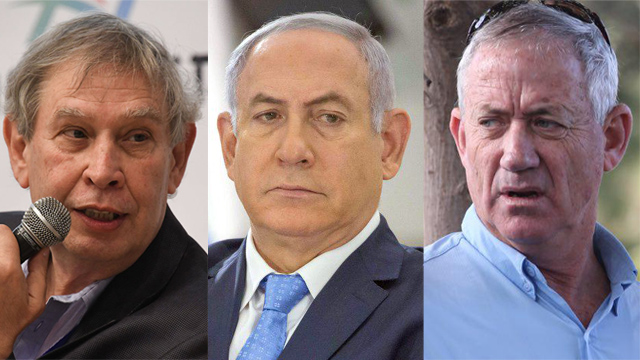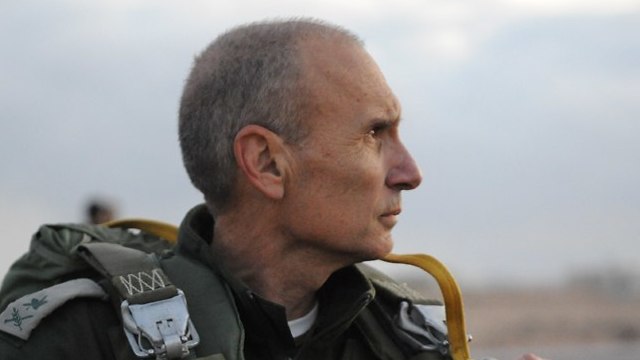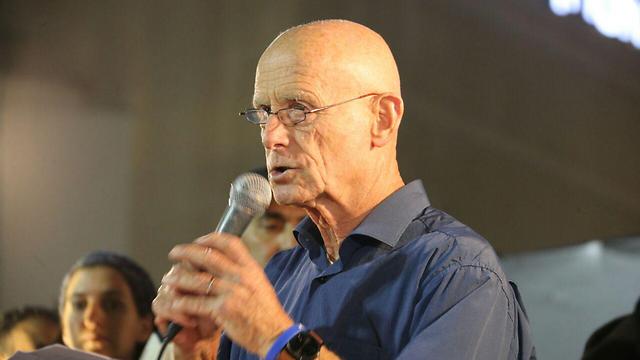

Former IDF brass insist tapping phones necessary to plug leaks
After former Shin Bet chief Ami Ayalon says bugging phones of top IDF generals and security officials is common and necessary practice after reports surface that PM allegedly tapped phones of two former senior officials, host of former generals justify strategy for safeguarding state secrets, insist they knew they too were being listened to.
Netanyahu had allegedly ordered then-head of the Shin Bet Yoram Cohen to wiretap former IDF chief of staff Benny Gantz and former Mossad director Tamir Pardo, the "Uvda" investigative television program reported Thursday—a claim Netanyahu vehemently denied on Friday.
Gantz served as the military’s head between 2011 and 2014, while Pardo served between 2011 and 2016.
According to the generals, not only would such a move by a prime minister be legal, but also necessary. A number of the generals also believe that they were listened to in the past and say that they take no issue with the possibility.
Earlier, former Shin Bet chief Major-General (res.) Ami Ayalon told Ynet that generals have been wiretapped in the past for fear of leaks, adding that such surveillance is justified in the event of a sensitive operation.
General (res.) Yaakov Amidror, a former general and national security advisor, also weighed in on the matter, supporting Ayalon’s contention.
“The job of the prime minister is to make sure that important state secrets are not leaked in order to prevent damage to the state’s security,” he said.
“Therefore, mechanisms exist to which he can turn according to the need and they decide who to wiretap,” he added. “In other words, the prime minister cannot decide who to tap.”
Another former general, Gershon Hacohen who served as commander of the General Staff, also urged calm over the reports, adding that his telephone too had also been bugged.
“There’s no need to get excited. I was also wiretapped. It happened. I’m aware that this is part of the obligations of a person who is in the security apparatus,” he said.
“During the disengagement (from Gaza in 2005—ed.), I was the commander of forces who were expected to evacuate the residents of Gush Katif,” he continued, in reference to the bloc of 17 Israeli settlements once located in the southern Gaza strip.
“But I prayed every day that it wouldn’t happen. It is fair to assume that there was a question about where I stood. Between me and the then-IDF chief of Staff Dan Halutz there was trust. That’s why I told him as a word of honor that I was ready to carry out what was imposed on me. Whether they believed me, I don’t know . But it is fair to assume that in a case like that I was tapped,” he surmised.
According to Hacohen, the issue of trust between the prime minister and the leaders of the security establishment remains problematic, but that this is not restricted to Netanyahu.
“There were differences of opinion between David Ben Gurion and the Chief of Staff Yigal Alon during the War of Independence,” the former general continued. “The arguments were known and they could be seen. The suspicion and the tension between the leaders are an inseparable part of, and are built into, every system that is not a production line for sewing clothes,” Hacohen continued.
General Amiram Levin (res.), who in the past served as the head of the Mossad and commander of Northern Command, also entered the fray, reinforcing the notion that such bugging is a necessary component of maintaining state secrets.
“The matter of defending state secrets is important in order to ensure that there are not leaks and to deter against leaks. I have great respect for Tamir Pardo, but as the operation for attacking the nuclear project approached, he knew that there was a lack of trust and transparency at the highest echelons," he argued.
"These echelons need to make the decision together which is why it is serious and worrying. I don’t know if the prime minister sought, specifically, to tap the phones, but the decision on whether in one case or another tapping should be used is legitimate and that is the role of the Shin Bet.
“There are senior officials who are supposed to safeguard state security, and their responsibility and knowledge should be enough to keep them quiet. But in recent times there has been chattering among the officials, including Netanyahu’s decision to reveal the details of the (Iranian) nuclear project and the book published by Ehud Barak," Levin lamented.
"In my opinion this is leaking of state secrets. The phenomenon is extremely concerning and that’s why we have to act with all means to ensure it doesn’t happen.”
Other former generals, including Amos Yaron, who served as director of the Defense Ministry, also defended Ayalon’s comments. By contrast, former general Danny Rothschild, who in the past served as the Coordinator of Government Activities in the Territories (COGAT), insists that he was never aware of any such practices, and that if they were taking place, they were wrong.
“I am not aware of wiretapping that took place among senior officers, and if there was I think it’s unnecessary and wrong,” Rothschild said. "If you’re not confident about a specific officer, fire him."


















